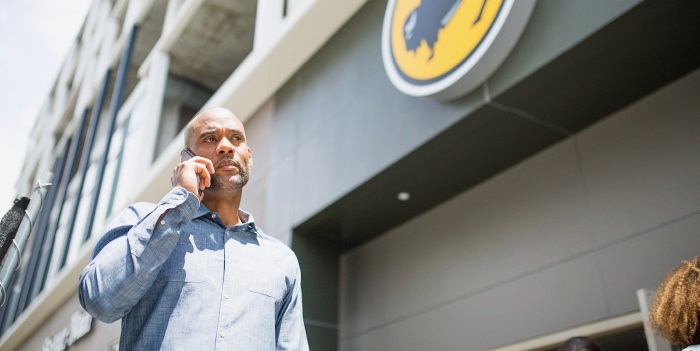Buffalo Wild Wings franchisee aims to grow Black-owned businesses

 Webb says securing capital for down payments, obtaining traditional financing, and not knowing about conventional banking alternatives, are the biggest challenges Black business owners face.
Webb says securing capital for down payments, obtaining traditional financing, and not knowing about conventional banking alternatives, are the biggest challenges Black business owners face.Karim Webb knows how tough it is to secure financing to open a business. Back in 2009, at the height of the economic recession, Webb couldn’t get financing to open his first Buffalo Wild Wings store in Torrance, Calif. Not one to give up, he found individual investors and raised enough money to open that unit and another on Crenshaw Blvd. in south Los Angeles, in 2011. He and his business partner, Edward Barnett, now own four BWW restaurants.
Why aren't there more Black-owned restaurant businesses?
The first reason is access to capital. There are many talented African-American operators within the restaurant industry, but the impact of 400 years of institutional unfairness—redlining, under-resourced schools, biased underwriting, etc.—has resulted in Black people not establishing or growing assets. Because of that, capital to fund ideas and talent are disproportionately scarce.
How can our industry reverse that trend?
It must develop more creative ways for qualified minority operators to finance ownership opportunities, ways that circumvent the traditional methods they’re unable to access.
What are the biggest challenges when trying to increase ownership opportunities?
Securing capital for down payments, obtaining traditional financing, and not knowing about conventional banking alternatives—these are the biggest challenges. Most Black operators are unfamiliar with venture capital or private equity.
Why is black franchising important,and how can it make a difference?
The chance to become an owner is an incentive to be one's best. That's how communities improve, with individuals in communities being high-character leaders. Owners who have the resources to build wealth improve their and their families' health outcomes and educational attainment. Ownership is the carrot to incentivize this.
Are more banks and corporations ready to assist Black operators in securing upfront capital to start businesses?
We’re seeing in the post-George Floyd world that a lot of big banks and corporations are starting to talk about more than just market share and share price. They are realizing that those two things can’t be the only goals anymore. They’ve got to think more about what is in the best interest, the greater good of the country. We all need to be healthy for our economy to be solid.
How did becoming a franchise owner change your life?
Being a franchisee provides the foundation of my income and platform, and it has enabled my civic and community engagement. When I opened my first Buffalo Wild Wings, I also started working with some nonprofits in the community. I joined the California Community Foundation, the Los Angeles Board of Airport Commissioners, and became board chair of the local community college. My big epiphany came when I realized I wasn’t just selling wings and beer. I was helping develop young people. That changed everything for me.
What advice would you give others who want to open their own restaurant businesses? What steps should they take?
Become a world-class operator in an existing business first. If you can't do it for someone else, you probably can't do it for yourself.